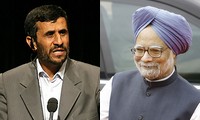A major Indian trade mission is in Iran seeking to exploit Tehran’s increasing diplomatic and commercial isolation to rectify India’s trade imbalance with Iran. But while Indian companies are understandably eager to take advantage of the resulting commercial opportunities, the Indian government must soothe U.S., Israeli and European concerns that Indian firms will simply undercut international sanctions against Iran by “backfilling” Western companies currently departing the country.
India’s behavior highlights a major problem with the Iran sanctions regime: Many countries face a different set of calculations with regard to Iran than the United States, Israel and the European and Persian Gulf governments that support the sanctions on Tehran. An Iran that possesses nuclear warheads and long-range ballistic missiles represents a plausible military threat to the latter group. But for India, China, Russia and many other non-Western countries, an Iranian attack on their own countries remains a remote contingency. From New Delhi’s perspective, for instance, a nuclear-armed Iran would pale as a threat compared to China’s growing military power and Pakistan’s nuclear arsenal. Like America and its allies, India fears nuclear terrorism, but New Delhi sees this danger as emanating from Pakistan’s militants, rather than from Iran’s Revolutionary Guards.
Countries like India that perceive Iran as a problem but not a major threat must balance the value of maintaining trade and other ties with Tehran with the potential costs of antagonizing U.S. policymakers leading the drive for global sanctions. Should Washington go so far as to sanction their firms for engaging in commerce with Iran, it would mean losing business in the United States. Costs might also be incurred with regard to their ties with Israel, Saudi Arabia and Iran’s other regional adversaries. The Israeli component is especially important for India. Ties between the two countries have improved markedly since the end of the Cold War and the decline of India’s commitment to nonalignment, with Israel becoming a major supplier of weapons, intelligence and high technology to India.

